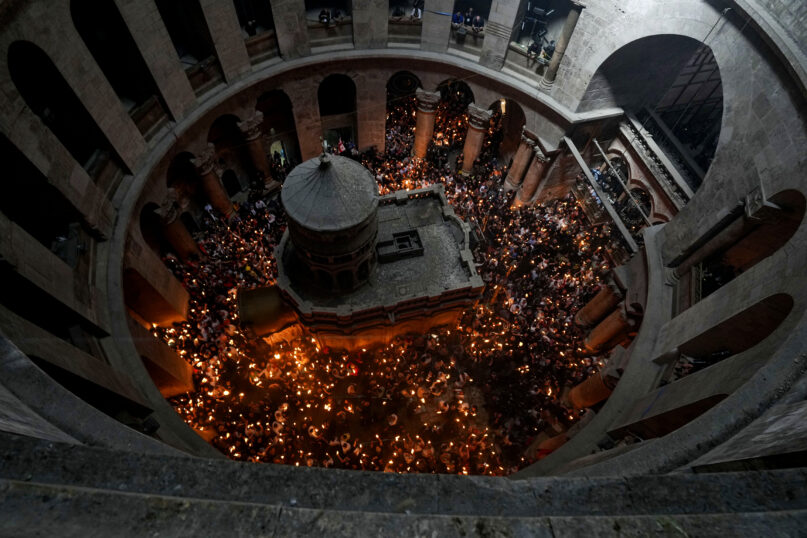(RNS) — On Friday, Dimitris Alikakos, a Greek journalist, walked out of court in Athens without the shadow of prosecution for the first time in almost half a decade.
His alleged crime: debunking miracles.
Alikakos has been in a legal battle with the Jerusalem Patriarchate, the headquarters of the Greek Orthodox Church in the Holy Land, and several of its priests since 2019, when he published a book challenging the miracle of the Holy Fire, the flames that emerge on Great Saturday, the day before Easter, at the Church of the Holy Sepulchre, where Jesus is said to have been resurrected.
The flames are blessed by the Patriarch of Jerusalem and from there transported to other centers in the Orthodox Christian world in time for celebrations of Christ’s resurrection on Easter. The fires taken to Greece arrive on a special flight organized by the Greek air force, received with full honors by the Greek government.
Though not a canonical belief of Orthodox Christianity, the Holy Fire is a widely and deeply held folk tradition among Greek laity that the fires ignite miraculously.
RELATED: Dissent from Traditional Plan dominates United Methodists’ top court meeting
In 2018, Alikakos traveled to Jerusalem to investigate the ritual, which takes place every year.
“It was never mentioned by the early church, or by the apostolic or later fathers in the 3rd, 4th, 5th, or 6th century,” Alikakos’ lawyer, Athanasios Anagnostopoulos, said. “It was never sanctioned as an article of faith by the ecumenical councils. In fact, it was initially a Frankish belief that emerged in the Middle Ages.”
Alikakos told RNS that it was his own religious background that led him to the Investigation. “My father was an Orthodox priest, and he first talked to me about the fraud of the Holy Fire,” he said.
In Jerusalem, Alikakos interviewed several priests, including Archbishop Isodoros, who is responsible for the Church of the Holy Sepulchre’s ritual objects, such as the candles that carry the Holy Fire.
In both his book and in videos posted on YouTube, Alikakos recorded testimony that the priests themselves lit the flames.
The Jerusalem Patriarchate did not take Alikakos’ report lying down.
“What is written in the disputed book is the product of fictional stories invented by the author with the obvious aim of scandalizing the faithful and obtaining financial benefit from the sales of the book,” the Patriarchate announced in 2019. It said the timing of the book’s release, just before Easter, was proof of “the deeper motives of the author and the publishing house.”
The Patriarchate soon opened both criminal and civil cases against Alikakos and his publisher, charging them with defamation, confidentiality violations and personal data violations. They also brought a case against Google in an attempt to have Alikakos’ video removed from YouTube.
At the time, the church claimed that amongst their damages was that the Orthodox faithful would be led to doubt their priests.
The patriarchate as an organization soon backed off the case, but Archbishop Isodoros had kept up the criminal charges against Alikakos until the journalist was finally acquitted of all charges on Friday.
“It’s a slander case,” said Anagnostopoulos. “Isodoros claimed he was slandered by the fact that Alikakos wrote this book.”
Neither the Patriarchate nor Isodoros’ legal team responded to RNS’ request for comment.
Alikakos said he welcomed the attention the trial brought to his investigation. “The plaintiffs have tried to hide the truth. I feel great joy and satisfaction that their video testimonies were heard in court today, where they confess that the Holy Fire lights up naturally,” Alikakos told the Balkan Investigative Reporting Network.
Though the matter ended in an acquittal, its longevity speaks to the powerful position the Orthodox church still holds in Greece, whose constitution deems it the “prevailing religion” of the modern Greek state.
RELATED: Dissent from Traditional Plan dominates United Methodists’ top court meeting
In recent years, Greek secularists have fought to decouple the church from Greece’s public education system, and this year in February, the church lobbied intensively against the Greek government in an attempt to block it from legalizing gay marriage.
“Essentially, today Greek secular justice decides whether it will sever the ties of our country with the Middle Ages or whether it will continue to blindly face eternally uncontrolled and unscrupulous monstrous fraudsters, as long as the latter wear a ‘rassa,’” said Petros Tatsopoulos, a Greek journalist and former parliamentarian, using the Greek word for cassock.





